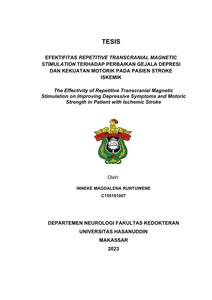Runtuwene, Inneke Magdalena (2023) EFEKTIFITAS REPETITIVE TRANSCRANIAL MAGNETIC STIMULATION TERHADAP PERBAIKAN GEJALA DEPRESI DAN KEKUATAN MOTORIK = The Effectivity of Repetitive Transcranial Magnetic Stimulation on Improving Depressive Symptoms and Motoric Strength in Patient with Ischemic Stroke. Thesis thesis, Universitas Hasanuddin.
![[thumbnail of Cover]](/33702/1.hassmallThumbnailVersion/C155191007_tesis_03-05-2023%20cover1.jpg)

C155191007_tesis_03-05-2023 cover1.jpg
Download (290kB) | Preview
C155191007_tesis_03-05-2023 bab 1-3.pdf
Download (966kB)
C155191007_tesis_03-05-2023 dp.pdf
Download (458kB)
C155191007_tesis_03-05-2023.pdf
Restricted to Repository staff only until 17 April 2026.
Download (1MB)
Abstract (Abstrak)
Introduction: Post stroke depression is often encountered and can cause several problems. Depression can slow down post-stroke recovery and have a negative impact on motoric improvement. Giving antidepressants in post-stroke depression can reduce the severity, but its effectiveness takes a long time of approximately 1 month. Transcranial magnetic stimulation has been shown to be effective in improving depression and motor improvement in stroke. Aim: Assess effectiveness of rTMS in improving depressive symptoms and motor strength in ischemic stroke patients. Methods: Experimental study with a randomized pretest-posttest control group design was conducted at Wahidin Sudirohusodo Hospital, and a network hospital in Makassar from August 2022-October 2022. Statistics were carried out using the Statistical Package for the Social Sciences (SPSS) version 25. The study protocol was approved by the Ethics Committee of Health Research, Faculty of Medicine, Hasanuddin University.
Result: A total of 40 subjects met the criteria, and were divided into a treatment group (n=20) and a control group (n=20). The HDRS score in the treatment group was smaller than the control group by using the Mann Whitney U test to obtain statistically significant results in the treatment group and the control group with p=0.000. The value of left extremity motor strength in the treatment group was greater than that of the control group using the Wilcoxon Test obtained p = 0.006 (upper left extremity), p = 0.004 (lower left extremity). The correlation of the HDRS score to motor strength in the treatment and control groups showed a negative correlation of the HDRS score to the left extremity using the Spearman Test obtained p=0.006 (upper left extremity), p=0.019 (lower left extremity).
Discussion: There were improvements in depressive symptoms in the treatment group and the control group, as well as improvements in motor strength in the treatment group. There is a negative correlation between the HDRS score and motor strength, especially the left extremity. The lower the HDRS value, the higher the motor strength value.
Conclusion: Repetitive Transcranial Magnetic Stimulation is effective in improving depressive symptoms and motor strength in ischemic stroke given standard ischemic stroke therapy, antidepressants and rTMS.
Keywords: Ischemic stroke, Antidepressants, Hamilton depression rating scale (HDRS), Repetitive Transcranial Magnetic Stimulation.
| Item Type: | Thesis (Thesis) |
|---|---|
| Uncontrolled Keywords: | Ischemic stroke, Antidepressants, Hamilton depression rating scale (HDRS), Repetitive Transcranial Magnetic Stimulation. |
| Subjects: | R Medicine > R Medicine (General) |
| Divisions (Program Studi): | Fakultas Kedokteran > PPDS Ilmu Penyakit Saraf |
| Depositing User: | S.Sos Rasman - |
| Date Deposited: | 30 May 2024 02:34 |
| Last Modified: | 30 May 2024 02:34 |
| URI: | http://repository.unhas.ac.id:443/id/eprint/33702 |


